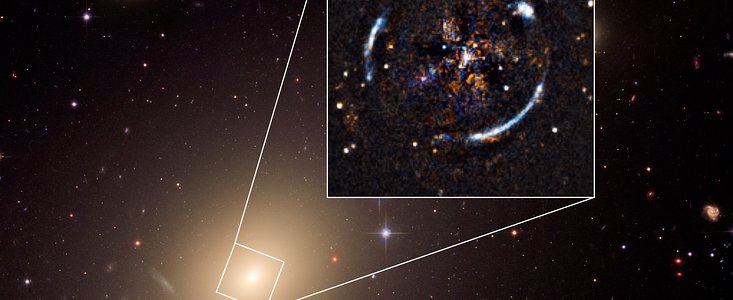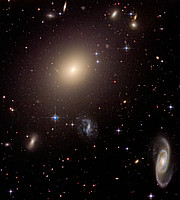Persbericht
VLT doet meest precieze test van Einsteins algemene relativiteitstheorie buiten de Melkweg
21 juni 2018
Astronomen die gebruik maken van het MUSE-instrument van ESO’s Very Large Telescope in Chili en de Hubble-ruimtetelescoop van NASA en ESA hebben de meest precieze test tot nu toe gedaan van Einsteins algemene relativiteitstheorie buiten de Melkweg. Het nabije sterrenstelsel ESO 325-G004 fungeert als een sterke zwaartekrachtlens en vervormt het licht van een verder weg staand sterrenstelsel tot een Einsteinring. Door de massa van ESO 325-G004 te vergelijken met de kromming van de omliggende ruimte, ontdekten de astronomen dat de zwaartekracht zich op deze astronomische lengteschalen gedraagt zoals voorspeld door de algemene relativiteitstheorie. Daarmee zijn enkele alternatieve zwaartekrachttheorie ontkracht.
Met behulp van het MUSE-instrument van ESO’s VLT heeft een team onder leiding van Thomas Collett van de Universiteit van Portsmouth (VK) eerst de massa van ESO 325-G004 berekend door de bewegingen van sterren in dit relatief nabije elliptische sterrenstelsel te meten.
Collett legt uit: ‘We hebben gegevens van de Very Large Telescope in Chili gebruikt om te meten hoe snel de sterren in ESO 325-G004 bewegen. Hieruit konden we afleiden hoeveel massa er in dit sterrenstelsel aanwezig moet zijn om deze sterren in hun omloopbanen te houden.’
Maar het team heeft ook een ander aspect van de zwaartekracht gemeten. Met behulp van de Hubble-ruimtetelescoop van NASA en ESA namen ze een Einsteinring waar die is ontstaan doordat ESO 325-G004 het licht van een ver verwijderd sterrenstelsel vervormt. Aan de hand van deze waarnemingen konden de astronomen meten hoe licht, en daarmee dus ook de ruimtetijd, door de enorme massa van ESO 325-G004 wordt afgebogen.
Einsteinsalgemene relativiteitstheorie voorspelt dat objecten de hen omringende ruimtetijd vervormen, waardoor passerend licht wordt afgebogen. Dit resulteert in een verschijnsel dat het zwaartekrachtlenseffect wordt genoemd. Dit effect valt alleen op bij objecten die heel veel massa hebben. Inmiddels zijn een paar honderd van die sterke zwaartekrachtlenzen bekend, maar de meeste zijn te ver weg om hun massa exact te kunnen meten. Met een afstand van ‘slechts’ 450 miljoen lichtjaar is het sterrenstelsel ESO 325-G004 een van de meest nabije lenzen.
Collett vervolgt: ‘We kennen de massa van het voorgrondstelsel van MUSE en we hebben de sterkte van het lenseffect gemeten zoals Hubble dat laat zien. Vervolgens hebben we deze twee manieren om de sterkte van de zwaartekracht te meten met elkaar vergeleken, en het resultaat was precies wat de algemene relativiteitstheorie voorspelt, met een onzekerheid van slechts 9 procent. Daarmee is dit de meest precieze test van de algemene relativiteitstheorie buiten de Melkweg tot nu toe. En dit met behulp van slechts één sterrenstelsel!’
Op de schaal van ons zonnestelsel is de algemene relativiteitstheorie met grote nauwkeurigheid getoetst, maar aan nauwkeurige tests op grotere astronomische schalen ontbrak het tot nu toe. Het testen van de langeafstandseigenschappen van de zwaartekracht is van cruciaal belang om de geldigheid van ons huidige kosmologische model te onderzoeken.
Deze bevindingen kunnen belangrijke gevolgen hebben voor alternatieve zwaartekrachtmodellen. Deze alternatieve theorieën voorspellen dat de effecten van de zwaartekracht op de kromming van ruimtetijd ‘schaalafhankelijk’ zijn. Dit betekent dat de zwaartekracht zich op extragalactische lengteschalen anders zou moeten gedragen dan op de kleinere schaal van het zonnestelsel. Collett en zijn team hebben vastgesteld dat dit waarschijnlijk niet het geval is tenzij de verschillen alleen optreden op lengteschalen van meer dan 6000 lichtjaar.
‘Het is geweldig dat het heelal ons lenzen levert die we als laboratoria kunnen gebruiken’, voegt teamlid Bob Nichol van de Universiteit van Portsmouth daaraan toe. ‘Het is zo bevredigend om de beste telescopen ter wereld in te zetten om Einstein op de proef te stellen, en erachter te komen dat hij gelijk had.’
Meer informatie
De resultaten van dit onderzoek staan in het artikel ‘A precise extragalactic test of General Relativity’ van Collett et al., dat in het tijdschrift Scienceverschijnt.
Het onderzoeksteam bestaat uit T.E. Collett (Institute of Cosmology and Gravitation, Universiteit van Portsmouth, VK), L.J. Oldham (Institute of Astronomy, Universiteit van Cambridge, VK), R. Smith (Centre for Extragalactic Astronomy, Durham University, Durham, VK), M.W. Auger (Institute of Astronomy, Universiteit van Cambridge, VK), K.B. Westfall (Institute of Cosmology and Gravitation, Universiteit van Portsmouth, VK; University of California Observatories – Lick Observatory, Santa Cruz, VS), D. Bacon (Institute of Cosmology and Gravitation, Universiteit van Portsmouth, VK), R.C. Nichol (Institute of Cosmology and Gravitation, Universiteit van Portsmouth, VK), K.L. Masters (Institute of Cosmology and Gravitation, Universiteit van Portsmouth, VK), K. Koyama (Institute of Cosmology and Gravitation, Universiteit van Portsmouth, VK), R. van den Bosch (Max-Planck-Institute für Astronomie, Königstuhl, Heidelberg, Duitsland).
ESO is de belangrijkste intergouvernementele astronomische organisatie in Europa en verreweg de meest productieve sterrenwacht ter wereld. Zij wordt ondersteund door vijftien lidstaten: België, Denemarken, Duitsland, Finland, Frankrijk, Italië, Nederland, Oostenrijk, Polen, Portugal, Spanje, Tsjechië, het Verenigd Koninkrijk, Zweden en Zwitserland, en door gastland Chili, met Australië als strategische partner. ESO voert een ambitieus programma uit, gericht op het ontwerpen, bouwen en beheren van grote sterrenwachten die astronomen in staat stellen om belangrijke wetenschappelijke ontdekkingen te doen. Ook speelt ESO een leidende rol bij het bevorderen en organiseren van samenwerking op astronomisch gebied. ESO beheert drie waarnemingslocaties van wereldklasse in Chili: La Silla, Paranal en Chajnantor. Op Paranal staan ESO’s Very Large Telescope (VLT) en haar toonaangevende Very Large Telescope Interferometer, evenals twee surveytelescopen – VISTA, die in het infrarood werkt, en de op zichtbare golflengten opererende VLT Survey Telescope. ESO speelt tevens een belangrijke partnerrol bij twee faciliteiten op Chajnantor, APEX en ALMA, het grootste astronomische project van dit moment. En op Cerro Armazones, nabij Paranal, bouwt ESO de 39-meter Extremely Large Telescope, de ELT, die ‘het grootste oog op de hemel’ ter wereld zal worden.
Links
- Onderzoeksartikel
- Persbericht ESA/Hubble
- Foto’s van de VLT
- Informatie over het MUSE-instrument van de VLT
Contact
Thomas Collett
Institute of Cosmology and Gravitation — University of Portsmouth
Portsmouth, UK
Tel: +44 239 284 5146
E-mail: thomas.collett@port.ac.uk
Richard Hook
ESO Public Information Officer
Garching bei München, Germany
Tel: +49 89 3200 6655
Mobiel: +49 151 1537 3591
E-mail: pio@eso.org
Marieke Baan (Perscontact Nederland)
ESO Science Outreach Network
en NOVA Informatie Centrum
Tel: +31(0)20-5257480
E-mail: eson-netherlands@eso.org
Over dit bericht
| Persberichten nr.: | eso1819nl |
| Naam: | ESO 325-G004 |
| Type: | Early Universe : Cosmology |
| Facility: | Very Large Telescope |
| Instruments: | MUSE |
| Science data: | 2018Sci...360.1342C |
Our use of Cookies
We use cookies that are essential for accessing our websites and using our services. We also use cookies to analyse, measure and improve our websites’ performance, to enable content sharing via social media and to display media content hosted on third-party platforms.
ESO Cookies Policy
The European Organisation for Astronomical Research in the Southern Hemisphere (ESO) is the pre-eminent intergovernmental science and technology organisation in astronomy. It carries out an ambitious programme focused on the design, construction and operation of powerful ground-based observing facilities for astronomy.
This Cookies Policy is intended to provide clarity by outlining the cookies used on the ESO public websites, their functions, the options you have for controlling them, and the ways you can contact us for additional details.
What are cookies?
Cookies are small pieces of data stored on your device by websites you visit. They serve various purposes, such as remembering login credentials and preferences and enhance your browsing experience.
Categories of cookies we use
Essential cookies (always active): These cookies are strictly necessary for the proper functioning of our website. Without these cookies, the website cannot operate correctly, and certain services, such as logging in or accessing secure areas, may not be available; because they are essential for the website’s operation, they cannot be disabled.
Functional Cookies: These cookies enhance your browsing experience by enabling additional features and personalization, such as remembering your preferences and settings. While not strictly necessary for the website to function, they improve usability and convenience; these cookies are only placed if you provide your consent.
Analytics cookies: These cookies collect information about how visitors interact with our website, such as which pages are visited most often and how users navigate the site. This data helps us improve website performance, optimize content, and enhance the user experience; these cookies are only placed if you provide your consent. We use the following analytics cookies.
Matomo Cookies:
This website uses Matomo (formerly Piwik), an open source software which enables the statistical analysis of website visits. Matomo uses cookies (text files) which are saved on your computer and which allow us to analyze how you use our website. The website user information generated by the cookies will only be saved on the servers of our IT Department. We use this information to analyze www.eso.org visits and to prepare reports on website activities. These data will not be disclosed to third parties.
On behalf of ESO, Matomo will use this information for the purpose of evaluating your use of the website, compiling reports on website activity and providing other services relating to website activity and internet usage.
Matomo cookies settings:
Additional Third-party cookies on ESO websites: some of our pages display content from external providers, e.g. YouTube.
Such third-party services are outside of ESO control and may, at any time, change their terms of service, use of cookies, etc.
YouTube: Some videos on the ESO website are embedded from ESO’s official YouTube channel. We have enabled YouTube’s privacy-enhanced mode, meaning that no cookies are set unless the user actively clicks on the video to play it. Additionally, in this mode, YouTube does not store any personally identifiable cookie data for embedded video playbacks. For more details, please refer to YouTube’s embedding videos information page.
Cookies can also be classified based on the following elements.
Regarding the domain, there are:
- First-party cookies, set by the website you are currently visiting. They are stored by the same domain that you are browsing and are used to enhance your experience on that site;
- Third-party cookies, set by a domain other than the one you are currently visiting.
As for their duration, cookies can be:
- Browser-session cookies, which are deleted when the user closes the browser;
- Stored cookies, which stay on the user's device for a predetermined period of time.
How to manage cookies
Cookie settings: You can modify your cookie choices for the ESO webpages at any time by clicking on the link Cookie settings at the bottom of any page.
In your browser: If you wish to delete cookies or instruct your browser to delete or block cookies by default, please visit the help pages of your browser:
Please be aware that if you delete or decline cookies, certain functionalities of our website may be not be available and your browsing experience may be affected.
You can set most browsers to prevent any cookies being placed on your device, but you may then have to manually adjust some preferences every time you visit a site/page. And some services and functionalities may not work properly at all (e.g. profile logging-in, shop check out).
Updates to the ESO Cookies Policy
The ESO Cookies Policy may be subject to future updates, which will be made available on this page.
Additional information
For any queries related to cookies, please contact: pdprATesoDOTorg.
As ESO public webpages are managed by our Department of Communication, your questions will be dealt with the support of the said Department.








